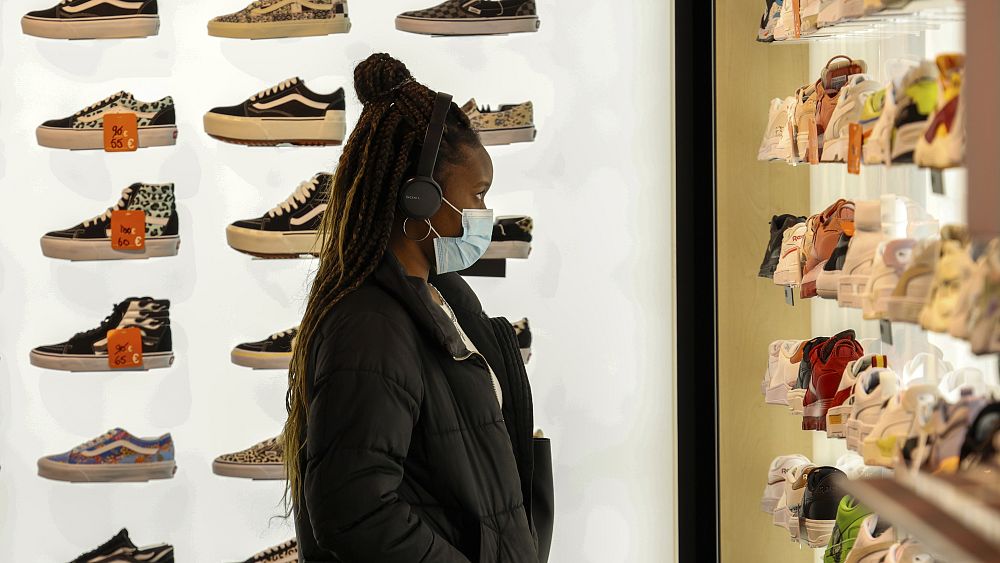
Inflation will remain high across the eurozone until at least the end of the summer, Brussels has warned.
Soaring energy prices and supply chain disruptions are being blamed.
In the first quarter of this year, inflation will hit 4.8% and stay above 3% until the third period, according to the latest economic forecasts from the European Commission. The bloc will have to wait until the fourth quarter of 2022 to see inflation fall to 2.1%.
This prediction is based on the assumption that supply bottlenecks will gradually ease and gas prices will drop as temperatures turn warmer and geopolitical tensions between Ukraine and Russia are resolved.
“Uncertainty will remain elevated,” said Paolo Gentiloni, EU commissioner for the economy.
“An acceleration of global inflation could entail a faster-than-anticipated tightening of monetary policy, with repercussions on global financing conditions and demand.”
The news comes on the heels of the January reading, which showed inflation hitting 5.1% on an annual basis, an all-time high figure mainly driven by increasingly expensive energy supplies, which recorded an eye-popping 28.6% price increase.
Unprocessed food, such as fresh fruit and vegetables, are also contributing to the inflationary pressure as a result of higher costs for fertilisers.
Overall, the European Union will have to deal with a 3.9% average inflation rate throughout the whole year, a dramatic change after a decade below the 2% limit.
The countries that are set to suffer the most pronounced prices hikes are Poland (6.8%), Lithuania (6.7%) and Slovakia (6.4%). On the other end, Malta (2.1%), Portugal (2.3%) and Denmark (2.5%) will register softer upticks, but still above the ECB benchmark.
Gentiloni added inflation in the eurozone could fall to 1.7% in 2023.
All eyes on Frankfurt
Thursday’s economic forecast also confirmed the EU as a whole returned to pre-pandemic economic levels in the third quarter of 2021, after a strong pick-up in spring and late autumn.
The bloc is expected to expand by 4.0% in 2022 and 2.8% in 2023. The 2022 figure is slighter lower than the one announced in the November forecast (4.3%), when the Omicron variant hadn’t still become widespread.
The new COVID-19 mutation, coupled with the persisting power crunch, caused a drastic slowdown in the EU’s economic activity during the last months of 2021 and continues to constrain growth. Coronavirus restrictions and staff shortages also exacerbated the decline.
“The Omicron variant has been spreading rapidly, with daily new cases still chasing one record high after another in many countries – though recent days give cause for optimism that the peak has passed for Europe as a whole,” said Gentiloni.
The Commissioner noted that COVID-19 infections are higher but milder in comparison to previous waves, leading to lower numbers of hospitalisations and deaths thanks to vaccination.
All eyes turn from Brussels to Frankfurt, where ECB President Christine Lagarde has yet to confirm if her institution will finally raise interest rates later this year to fight against inflation.
Interest rates in the eurozone have been negative since 2014, a policy introduced by Lagarde’s predecessor, Mario Draghi, as a response to sluggish inflation following the European debt crisis.
When inflation grows, interest rates are expected to follow suit. Those who lend money demand higher rates to ensure they don’t lose value when borrowers pay them back in the future.
For months, Lagarde has refused to commit to any sort of interest rate hike, but after January’s shocking 5.1% inflation reading, she surprised observers with hawkish comments that implied a willingness to tighten monetary policy in line with her counterparts in the US and the UK.
THE ROTTEN FISH: CAN OF WORMS OPENED OF APC & TINUBU'S GOVERNMENT OVER NIGERIA'S ECONOMIC DOWNTURN
WATCH THE CRITICAL ANALYSIS AND KNOW THE RESPONSIBLE PARTIES TO BLAME FOR NIGERIA'S ECONOMIC CHALLENGES, WHILE CITIZENS ENDURE SEVERE HARDSHIPS.Watch this episode of ISSUES IN THE NEWS on 9News Nigeria featuring Peter Obi's Special Adviser, Dr Katch Ononuju, 9News Nigeria Publisher, Obinna Ejianya and Tinubu Support Group Leader, McHezekiah Eherechi
The economic crisis and hardship in Nigeria are parts of the discussion.
Watch, leave your comments, and share to create more awareness on this issue.
#9NewsNigeria #Nigeria #issuesInTheNews #politics #tinubu THE ROTTEN FISH: CAN OF WORMS OPENED ...
DON'T FORGET TO SUBSCRIBE AND LEAVE YOUR COMMENTS FOR SUBSEQUENT UPDATES
#9newsnigeria #economia #economy #nigeria #government @9newsng
www.9newsng.com
